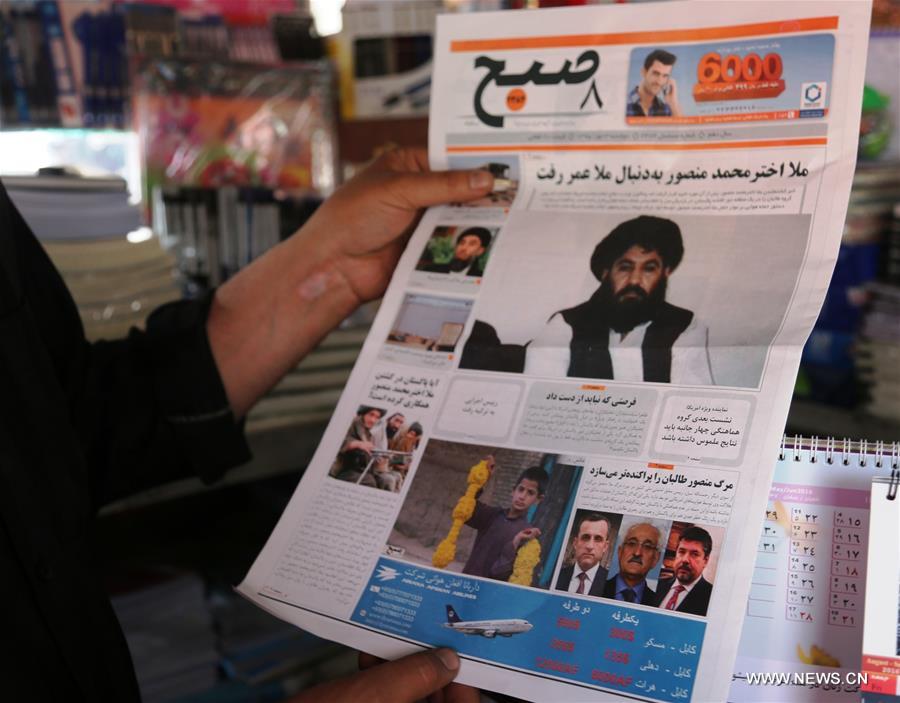Killing of Taliban chief Mullah Mansour
china.org.cn / chinagate.cn by Sajjad Malik, May 25, 2016 Adjust font size:
|
|
| An Afghan man reads the news of Taliban leader's death on a local newspaper in Kabul, capital of Afghanistan, May 23, 2016. U.S. President Barack Obama confirmed on Monday that Taliban leader Mullah Akhtar Mansoor was killed in a U.S. airstrike. (Xinhua/Rahmat Alizadah) |
The killing of Taliban leader Mullah Akhtar Mohammad Mansour has created new doubts about the future of peace in Afghanistan. Mansour was killed in a drone attack deep inside Pakistan's Balochistan province while reportedly driving a rental car. He was apparently eliminated for opposing the peace and reconciliation efforts in the war-ravaged country. But it is unclear how his death will help usher in peace in Afghanistan, when it could easily add to the existing confusion, making the achievement of peace and stability a distant dream.
The killing of Mansour came after last week's meeting of the four-nation Quadrilateral Coordination Group (QCG), comprising Afghanistan, China, Pakistan and the U.S., in Islamabad to explore ways to bring Taliban and Afghan representatives to the negotiating table. The group has pinned hopes on Mansour to deliver peace, as he was leading the group when the first direct talks with Taliban were held in July last year in Pakistan. However, Mansour failed to deliver. Instead of opting for peace, to show his power as a chief of a militant organization, he not only distanced himself from the talks but also increased attacks inside Afghanistan.
It is not known if the QCG group in the last meeting discussed or approved any policy to act tough with the Taliban in order to force them into peace talks. The other possibility is that the U.S. would have decided to deal with rebels in its own way, by bypassing the other partners. The attack is a major departure in U.S. policy, as the country rarely targets senior Afghan Taliban leaders living in Pakistan.
The Americans have shown their intentions. President Barack Obama said in Vietnam that Mansour was a hurdle in peace in Afghanistan and also responsible for several lethal attacks on the coalition forces and Afghan civilians. The implied meaning of Obama's message is that all militant leaders opposing the peace process will be targeted in future. This policy will get support from the Afghanistan government, which wants to eliminate the militants instead of sharing powers with them through any peace agreement.
The removal of Mansour will delay the start of any peace talks for an unspecified time. For the Taliban, there are more pressing issues aside from dialogue with the government. They will have to tackle the issue of succession first. There are reports that the rebels' council is holding consultations and a new "Emir" or chief will be chosen soon. But the problem may not end with the selection of a new chief, as he would have to win the support of all factions and field commanders before thinking of talks.
The Taliban have set certain pre-conditions for a dialogue, such as the implementation of Sharia law and the expulsion of all foreign troops. As the conditions cannot be fulfilled immediately, it will become difficult for the new leader to sell the idea of talks to the hardcore fighting cadres. It is likely that the new chief will try to speed up attacks in order to show that he was no less ferocious than his predecessors.
Pakistan's position has also become critical. The most important aspect is how to respond to the first-ever U.S. drone attack in its Balochistan region. The popular belief that it has clout over the Taliban and can force or coax them to join the peace process is also under scrutiny. There is growing skepticism about Pakistan's capability and intentions to deliver peace in Afghanistan due to the growing influence of India in Kabul.
Pakistan's prestige and position has been weakened after the killing of the top Taliban leader on its soil. There could also be domestic backlash after the attack, as opposition, media and civil society groups may demand answers from the government and the powerful army about the violation of its sovereignty.
The killing of Mansour also demonstrates the American sense of frustration in Afghanistan. After years of military and diplomatic efforts, the situation has not improved. The killing of Mansour may lead to a set of unintended consequences, such as the rise of the Islamic State in Afghanistan. It would be nightmare for everyone if the Taliban started joining Da'esh due to further fragmentation of their movement. Any such scenario will complicate the already fragile security situation in Afghanistan.
Sajjad Malik is a columnist with China.org.cn. For more information please visit:
http://www.china.org.cn/opinion/SajjadMalik.htm
Opinion articles reflect the views of their authors, not necessarily those of China.org.cn.
